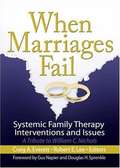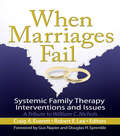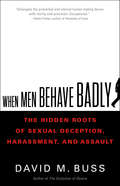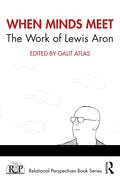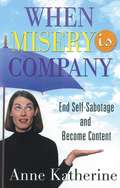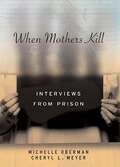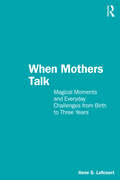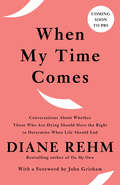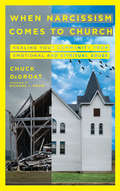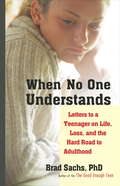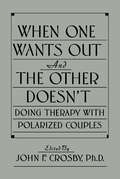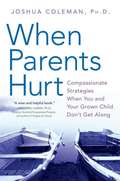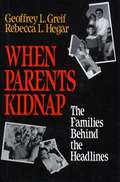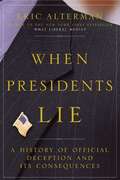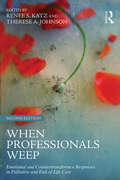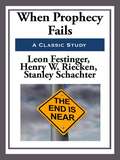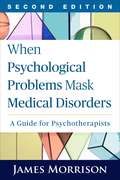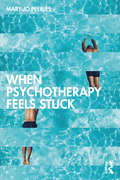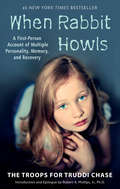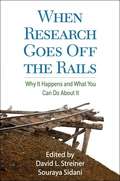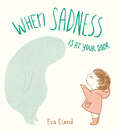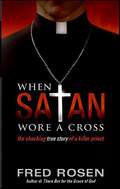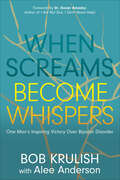- Table View
- List View
When Marriages Fail: Systemic Family Therapy Interventions and Issues
by Craig A. Everett'When Marriages Fail' presents several leading experts in the field discussing the full spectrum of clinical interventions and family therapy for troubled and divorcing families.
When Marriages Fail: Systemic Family Therapy Interventions and Issues
by Craig Everett Robert E LeeLeading experts reveal systemic and integrative approaches to family therapyWhen Marriages Fail: Systemic Family Therapy Interventions and Issues presents several leading experts in the field discussing the full spectrum of clinical interventions and family therapy for troubled and divorcing families. This comprehensive resource presents a broad overview of the literature that provides a foundation for the entire field, then narrows its focus to clearly review clinical assessment models and the special issues that may be factors in conflicted families. Therapists, psychologists, counselors, and social workers learn cutting-edge recommendations for policies protecting the well-being of children involved in divorce, plus practical, specific systemic treatment interventions that are illustrated with case studies.When Marriages Fail is separated into three logically organized sections. Part one provides a helpful overview of the field&’s evolving literature as it stands now and gives tools to therapists and their clients to explore their internal and dyadic processes in considering whether or not to divorce. The second part presents two systemic models that explore the dynamics of conflicted couples moving toward divorce and considers specific family circumstances that affect the entire divorce process, such as family violence, disclosure of gender orientation, and the unhappiness of the family&’s children. Part three discusses in detail specific and practical treatment interventions, considering factors involved when diverse families separate, divorce, and remarry.The text also provides a fitting tribute to William C. Nichols, a pioneer of marital and family therapy.Topics in When Marriages Fail include: the therapist&’s choices in helping couples process their own choices an ecosystemic look at the rights of children in divorce interventions for mourning, adulterous triangles, incongruent goals, cultural differences, or family of origin disclosing gay or lesbian orientation in marriage domestic violence issues children&’s trauma in the parental break-up family therapy interventions through three systemic stages of divorce remarriage of the first spouse in post-divorce families trauma of the betrayed spouse parent loss and serial relationships "gay divorces" and more! With Forewords by Douglas Sprenkle and Augustus Y. Napier as well as several international contributors who shed light on how this compelling subject is addressed outside of the United States, When Marriages Fail is an invaluable source of the latest knowledge and interventions for family therapists, counselors, social workers, and psychologists.
When Men Behave Badly: The Hidden Roots of Sexual Deception, Harassment, and Assault
by David BussA leading evolutionary psychologist and sex researcher provides a unified new theory of sexual conflict and shows how its battles play out in the bar room, the bedroom, and the boardroom.Sexual conflict permeates ancient religions, from injunctions about thy neighbor's wife to the permissible rape of infidels. It is etched in written laws that dictate who can and cannot have sex with whom. Its manifestations shape our sexual morality, evoking approving accolades or contemptuous condemnation. It produces sexual double standards that flourish even in the most sexually egalitarian cultures on earth. And although every person alive struggles with sexual conflict, most of us see only the tip of the iceberg: dating deception, a politician's unsavory sexual grab, the slow crumbling of a once-happy marriage, a romantic breakup that turns nasty.When Men Behave Badly shows that this "battle of the sexes" is deeper and far more pervasive than anyone has recognized, revealing the hidden roots of sexual conflict—roots that originated over deep evolutionary time—which define the sexual psychology we currently carry around in our 3.5-pound brains. Providing novel insights into our minds and behaviors, When Men Behave Badly presents a unifying new theory of sexual conflict, and offers practical advice for men and women seeking to avoid it.
When Minds Meet: The Work of Lewis Aron (Relational Perspectives Book Series)
by Galit AtlasThis extraordinary volume offers a sampling of Lewis Aron’s most important contributions to relational psychoanalysis. One of the founders of relational thinking, Aron was an internationally recognized psychoanalyst, sought after teacher, lecturer, and the Director of the New York University Postdoctoral Program in Psychotherapy and Psychoanalysis. His pioneering work introduced and revolutionized the concepts of mutuality, the analyst’s subjectivity, and the paradigm of mutual vulnerability in the analytic setting. During the last few years of his life, Aron was exploring the ethical considerations of writing psychoanalytic case histories and the importance of self-reflection and skepticism not only for analysts with their patients, but also as a stance towards the field of psychoanalysis itself. Aron is known for his singular, highly compelling teaching and writing style and for an unparalleled ability to convey complex, often comparative theoretical concepts in a uniquely inviting and approachable way. The reader will encounter both seminal papers on the vision and method of contemporary clinical practice, as well as cutting edge newer writing from the years just before his death. Edited and with a foreword by Galit Atlas, each chapter is preceded by a new introduction by some of the most important thinkers in our field: Jessica Benjamin, Michael Eigen, Jay Greenberg, Adrienne Harris, Stephen Hartman, Steven Kuchuck, Thomas Ogden, Joyce Slochower, Donnel Stern, Merav Roth, Chana Ullman, and Aron himself. This book will make an important addition to the libraries of experienced clinicians and psychoanalytic scholars already familiar with Aron’s work, as well as students, newer professionals or anyone seeking an introduction to relational psychoanalysis and one of its most stunning, vibrant voices.
When Misery is Company: End Self-Sabotage and Become Content
by Anne KatherineThis book offers solutions to anyone who has felt victimized, ostracized or left behind by life.Surprising as it may sound, many people take comfort in their own misery. Feeling too good for too long (or even feeling good at all) can be scary for people, explains Anne Katherine. "Achievement creates anxiety. Intimacy leads to fear. Happiness produces uneasiness. Pleasure causes pain. The solution to this dilemma: what feels good has to be stopped. I call this an addiction to misery." Katherine's fascination and perspective book provides immediate assistance to those people who think they might be making choices that keep them at a "carefully calibrated level of existence--beneath bliss and above despair."
When Morning Breaks: Coping With Miscarriage
by Melissa Sexson HansonCouples who suffer a miscarriage often feel themselves to be alone in grieving. They do not have access to the rituals that provide closure for other kinds of loss. Friends and families frequently feel awkward around the couple, not knowing what to say or do to be helpful. Here, finally, is a book for grieving parents that acknowledges their pain and offers encouragement for the future. In these meditations and prayers based on biblical passages, Melissa Sexson Hanson writes honestly and movingly of her own grief during two miscarriages and of the difficulty of the recovery process. She also describes clearly the faithfulness of God's healing presence in her life, providing a sense of hope to all those seeking comfort after a similar loss.
When Mothers Kill: Interviews from Prison
by Cheryl L. Meyer Michelle ObermanWinner of the 2008 Outstanding Book Award by the Academy of Criminal Justice SciencesMichelle Oberman and Cheryl L. Meyer don’t write for news magazines or prime-time investigative television shows, but the stories they tell hold the same fascination. When Mothers Kill is compelling. In a clear, direct fashion the authors recount what they have learned from interviewing women imprisoned for killing their children. Readers will be shocked and outraged—as much by the violence the women have endured in their own lives as by the violence they engaged in—but they will also be informed and even enlightened.Oberman and Meyer are leading authorities on their subject. Their 2001 book, Mothers Who Kill Their Children, drew from hundreds of newspaper articles as well as from medical and social science journals to propose a comprehensive typology of maternal filicide. In that same year, driven by a desire to test their typology—and to better understand child-killing women not just as types but as individuals—Oberman and Meyer began interviewing women who had been incarcerated for the crime. After conducting lengthy, face-to-face interviews with forty prison inmates, they returned and selected eight women to speak with at even greater length. This new book begins with these stories, recounted in the matter-of-fact words of the inmates themselves.There are collective themes that emerge from these individual accounts, including histories of relentless interpersonal violence, troubled relationships with parents (particularly with mothers), twisted notions of romantic love, and deep conflicts about motherhood. These themes structure the books overall narrative, which also includes an insightful examination of the social and institutional systems that have failed these women. Neither the mothers nor the authors offer these stories as excuses for these crimes.
When Mothers Talk: Magical Moments and Everyday Challenges from Birth to Three Years
by Ilene S. LefcourtWhen Mothers Talk is an intimate book about early child development and motherhood which offers an extraordinary view of the first three years of life and practical information that rarely gets talked about.Ilene Lefcourt's unique experience leading groups for over 35 years with mothers, their babies, and toddlers informs every page. Lefcourt sensitively links mothers' childhood memories with current mother-child interactions, and exquisitely details mothers' unfolding insights. Vivid examples of mothers' memories, with hidden answers to typical questions and concerns, trigger the reader's own memories, self-reflection, and new ideas. The narrative approach of When Mothers Talk speaks directly to the reader and activates an experience similar to being in a supportive mother-baby-toddler group.Experienced and new mothers, infant mental health students, and experienced professionals will find this original book, grounded in long-established ideas, exceptionally informative and inspiring.
When My Time Comes: Conversations About Whether Those Who Are Dying Should Have the Right to Determine When Life Should End
by Diane RehmFrom Diane Rehm, renowned radio host--one of the most trusted voices in the nation--and best-selling author: a book of candor and compassion, addressing the urgent, hotly contested cause of the Right-to-Die movement, of which she is one of our most inspiring champions.Soon to be a public television documentary of the same name, featuring the author.Through interviews with terminally ill patients, and with physicians, ethicists, spouses, relatives, and representatives of those who vigorously oppose the movement, Rehm gives voice to a broad range of people who are personally linked to the realities of medical aid in dying. The book presents the fervent arguments--both for and against--that are propelling the current debates across the nation about whether to adopt laws allowing those who are dying to put an end to their suffering. With characteristic even-handedness, Rehm skillfully shows both sides of the argument, providing the full context for this highly divisive issue.With a highly personal foreword by John Grisham, When My Time Comes is a response to many misconceptions and misrepresentations of end-of-life care; it is a call to action--and to conscience--and it is an attempt to heal and soothe our hearts, reminding us that death, too, is an integral part of life.
When Narcissism Comes to Church: Healing Your Community From Emotional and Spiritual Abuse
by Chuck DeGroatWhy does narcissism seem to thrive in our churches?isWhen Narcissism Comes to Church
When No One Understands: Letters to a Teenager on Life, Loss, and the Hard Road to Adulthood
by Brad SachsWhen Amanda first came to Dr. Sachs for treatment, she had attempted suicide more than once. Withdrawn and cynical, she refused to speak during her therapy sessions. Determined to connect, Dr. Sachs tried something unconventional: he wrote letters to Amanda between sessions and invited her to write back, thinking she might feel more comfortable opening up in this way--and indeed she did. This correspondence gradually built trust between them, helping her to survive and ultimately to heal.When No One Understands consists of twenty letters that Dr. Sachs wrote to Amanda over the course of her therapy. In these letters, Sachs reaches out to Amanda with the core message that there is nothing wrong with her--that adolescence is painful, complex, and challenging for everyone and that her emotional pain deserves to be honored, openly explored, and viewed with compassion. Dr. Sachs also addresses many of the common questions and concerns shared by all teens on such topics as relationships, breakups, drugs and alcohol, parents, family dynamics, and more.Along the way, Dr. Sachs offers adults an inspiring image of a truly open, human-to-human relationship between an adult and a teenager. Parents, mental health professionals, guidance counselors, educators, and others who work with teens will see how they might also bring honesty, compassion, and humility to bear in their interactions with young people in order to create truly healing and supportive relationships.
When One Wants Out And The Other Doesn't: Doing Therapy With Polarized Couples
by John F. CrosbyFor anyone who practices marriage and family therapy the author says they have one kind of client population that seems to be a modal or predominating type. For three decades he has experienced more marital situations where one of the couple wants “out” of the marriage and the other wants to “stay in” than any other type. The idea for this collection of first-person therapy methodologies developed after two successive national meetings of the American Association for Marriage and Family Therapy (AAMFT), in New York (1985) and Orlando (1986). The cases that were discussed were characterized by the presence of alcoholism, and drug and other addictions, rather than presentations that dealt with a polarized couple wherein the marriage had simply become a devitalized, ho-hum relationship. This volume seeks to address the balance.
When Parents Hurt: Compassionate Strategies When You and Your Grown Child Don't Get Along
by Joshua ColemanThis unique book supports parents who are struggling with the heartache of having a teenager or an adult child who is troubled, angry, or distant. Such rifts can cause unspeakable sorrow that parents too often must bear alone. Psychologist and parent Joshua Coleman, Ph.D., offers insight, empathy, and perspective to those who have lost the opportunity to be the parent they desperately wanted to be and who are mourning the loss of a harmonious relationship with their child. Through case examples and healing exercises, Dr. Coleman helps parents: Reduce anger, guilt, and shame Learn how temperament, the teen years, their own or a partner's mistakes, and divorce can strain the parent-child bond Come to terms with their own and their child's imperfections Maintain self-esteem through difficult times Develop strategies for rebuilding the relationship or move toward acceptance of what can't be changed Understand how society's high expectations of parents contribute to the risk of parental wounds By helping parents recognize what they can do, and let go of what they cannot, Dr. Coleman helps families develop more positive ways of healing themselves and relating to each other.
When Parents Kidnap: The Families Behind The Headlines
by Geoffrey L. Greif Rebecca L. HegarIt is estimated that 350,000 children a year are abducted by a family member. What happens when a child is kidnapped from home? What are the emotional and psychological consequences for the child who must live in hiding for weeks, months, or even years? How does the parent left behind cope with having no knowledge of the child's whereabouts or well-being? And what could lead a parent to inflict such a painful existence on his or her own child? Until now, little systematic research has been undertaken to find answers, and the scope and consequences of parental abduction have remained largely unknown. Now, in When Parents Kidnap, Geoffrey Greif and Rebecca Hegar provide the most comprehensive look yet at the problem of the abduction of children by their parents. The authors capture the experiences both of the parents searching for their children and the abductors who have taken them. We see vivid depictions of life on the run and learn the painful details of how children who have been in hiding for months and sometimes years cope with moving from town to town and school to school. We also learn how reunion with the searching parent affects them. The phenomenon of parental abduction is part of a larger social context of changes in the family. Almost a quarter of U.S. children live with only one parent - more than five million of them children of divorce - and the growing prevalence of parental abductions has officials and professionals alarmed. Greif and Hegar point the way to improvements in public policy by showing precisely how changes in custody, divorce, and other laws could help to reduce abduction of children, or resolve it more quickly. Identifying five common scenarios that end in abduction, Greif and Hegar help the reader to understand a wide range of abduction situations, and they provide specific suggestions for mental health professionals involved with families who have experienced this trauma.
When Presidents Lie: A History of Official Deception and Its Consequences
by Eric AltermanAlterman (English, City U. of New York-Brooklyn College) helps dispel two myths: that US presidents would never lie to the people; and that presidential lying began only with the current occupant of the position. Having a mere 500 pages, he does not go back farther than Franklin D. Roosevelt, and leaves out all the subsequent presidents except Truman, Kennedy, Johnson, Reagan, and of course Bush the second. Annotation ©2004 Book News, Inc. , Portland, OR (booknews. com)
When Professionals Weep: Emotional and Countertransference Responses in Palliative and End-of-Life Care (Series in Death, Dying, and Bereavement)
by Renee S. Katz Therese A. JohnsonWhen Professionals Weep speaks to the humbling and often transformational moments that clinicians experience in their careers as caregivers and healers—moments when it is often hard to separate the influence of our own emotional responses and worldviews from the patient’s or family’s. When Professionals Weep addresses these poignant moments—when the professional's personal experiences with trauma, illness, death, and loss can subtly, often stealthily, surface and affect the helping process. This edition, like the first, both validates clinicians’ experiences and also helps them process and productively address compassion fatigue, burnout, and secondary traumatic stress. New material in the second edition includes increased emphasis on the burgeoning fields of hospice and palliative care, organizational countertransference, mindfulness, and compassionate practice. It includes thought-provoking cases, self-assessments, and exercises that can be used on an individual, dyadic, or group basis. This volume is an invaluable handbook for practitioners in the fields of medicine, mental health, social work, nursing, chaplaincy, the allied health sciences, psychology, and psychiatry.
When Prophecy Fails
by Stanley Schachter Leon FestingerThe study reported in this volume grew out of some theoretical work, one phase of which bore specifically on the behavior of individuals in social movements that made specific (and unfulfilled) prophecies. We had been forced to depend chiefly on historical records to judge the adequacy of our theoretical ideas until we by chance discovered the social movement that we report in this book. At the time we learned of it, the movement was in mid-career but the prophecy about which it was centered had not yet been disconfirmed. We were understandably eager to undertake a study that could test our theoretical ideas under natural conditions. That we were able to do this study was in great measure due to the support obtained through the Laboratory for Research in Social Relations of the University of Minnesota. This study is a project of the Laboratory and was carried out while we were all members of its staff. We should also like to acknowledge the help we received through a grant-in-aid from the Ford Foundation to one of the authors, a grant that made preliminary exploration of the field situation possible.
When Psychological Problems Mask Medical Disorders, Second Edition
by James MorrisonWidely regarded as a standard clinical resource, this book helps practitioners think outside the mental health box and recognize when a client may need a medical evaluation. Part I provides an accessible overview of symptoms that can be observed in a standard mental status examination and may point to medical illness. Engaging case vignettes and interviewing pointers help readers hone their diagnostic skills. Part II presents concise facts--including basic medical information and physical and mental symptoms--on more than 60 diseases and syndromes. An easy-to-read chart in Part III cross-tabulates all of the disorders and symptoms for quick reference and comparison. New to This Edition *Reflects more than 15 years of advances in medical and mental health knowledge. *Updated throughout for DSM-5. *Additional medical disorders: celiac disease, traumatic brain injury, heavy-metal toxicity, and others. *Updated links to further reading on each health condition.
When Psychotherapy Feels Stuck
by Mary Jo PeeblesEvery therapist feels stuck at some point. Dr. Peebles offers ways of working with patients that clear openings for growth inside those stuck-places. When Psychotherapy Feels Stuck integrates wisdom from multiple theoretical schools. It balances explicit, systematized frameworks for thinking with sensory-based metaphors. Chapters interweave empirical research with clinical vignettes to describe the power of language choices, tolerating not-knowing, risking relationship, and creating meaning. Therapists from all theoretical backgrounds and experience levels will find something unexpected here that sparks hope and a fresh take when feeling stuck.
When Rabbit Howls
by Truddi ChaseThis is the true story of Truddi Chase, a woman who developed more than ninety personalities in order to cope with the horrendous abuse she suffered at the hands of her stepfather.
When Rabbit Howls: The Troops For Truddi Chase
by Truddi Chase"To escape the horror of violent abuse, the two-year-old child "went to sleep" and created the inner world of "the Troops," the 92 voices that shielded her from pain, but that she didn't know existed until adulthood. this is a journey through the fragmented world of the multiple personality—told by the Troop."—Amazon.com.
When Research Goes Off the Rails
by David Streiner Souraya SidaniFew behavioral or health science studies proceed seamlessly. This refreshingly candid guide presents firsthand vignettes of obstacles on the bumpy road of research and offers feasible, easy-to-implement solutions. Contributors from a range of disciplines describe real-world problems at each stage of a quantitative or qualitative research project from gaining review board approval to collecting and analyzing data and discuss how these problems were resolved. A detailed summary chart helps readers quickly find material on specific issues, methods, and settings. Written with clarity and wit, the vignettes provide exemplars of critical thinking that researchers can apply when developing the operational plan of a study or when facing practical difficulties in a particular research phase.
When Sadness is at Your Door
by Eva ElandA comforting primer in emotional literacy and mindfulness that suggests we approach the feeling of sadness as if it is our guest.Sadness can be scary and confusing at any age! When we feel sad, especially for long periods of time, it can seem as if the sadness is a part of who we are--an overwhelming, invisible, and scary sensation.In When Sadness Is at Your Door, Eva Eland brilliantly approaches this feeling as if it is a visitor. She gives it a shape and a face, and encourages the reader to give it a name, all of which helps to demystify it and distinguish it from ourselves. She suggests activities to do with it, like sitting quietly, drawing, and going outside for a walk. The beauty of this approach is in the respect the book has for the feeling, and the absence of a narrative that encourages the reader to "get over" it or indicates that it's "bad," both of which are anxiety-producing notions.Simple illustrations that recall the classic style of Crockett Johnson (Harold and the Purple Crayon) invite readers to add their own impressions.Eva Eland's debut picture book is a great primer in mindfulness and emotional literacy, perfect for kids navigating these new feelings--and for adult readers tackling the feelings themselves!
When Satan Wore A Cross: The Shocking True Story of a Killer Priest
by Fred RosenIn 1980 in Toledo, Ohio—on one of the holiest days of the church calendar—the body of a nun was discovered in the sacristy of a hospital chapel. Seventy-one-year-old Sister Margaret Ann had been strangled and stabbed, her corpse arranged in a shameful and stomach-churning pose. But the police's most likely suspect was inexplicably released and the investigation was quietly buried. Despite damning evidence, Father Gerald Robinson went free.Twenty-three years later the priest's name resurfaced in connection with a bizarre case of satanic ritual and abuse. It prompted investigators to exhume the remains of the slain nun in search of the proof left behind that would indelibly mark Father Robinson as Sister Margaret Ann's killer: the sign of the Devil.When Satan Wore a Cross is a shocking true story of official cover-ups, madness, murder and lies—and of an unholy human monster who disguised himself in holy garb.
When Screams Become Whispers: One Man's Inspiring Victory Over Bipolar Disorder
by Bob Krulish Alee AndersonKrulish bravely invites readers into some of his darkest days and most painful experiences as a person living with bipolar disorder.&” —Kristin Jarvis Adams, award-winning author of The Chicken Who Saved Us When Screams Become Whispers is a memoir that offers hope to those struggling with bipolar disorder and for friends and families who continue to fight alongside their struggling loved ones. When Screams Become Whispers, a raw look at bipolar disorder and the mania it drives, will allow loved ones to recognize and understand key identifiers, thus enabling them to better help. Ultimately, Bob Krulish&’s story sheds light on the systemic problems deeply rooted in the American mental healthcare system, highlighting the danger present when treatment is not readily available. Through great storytelling, readers are gifted with a greater appreciation for the need for de-stigmatization, demystification, greater resources, and a supportive community for those suffering from this poorly understood disorder. &“This is the book of a bipolar disorder survivor [who] refused to be only that . . . He&’s living proof that you could actually live, not only survive, with bipolar.&” —Dr. Francesc Colom, PsyD, PhD, MSc, coauthor of The Psychoeducation Manual for Bipolar Disorder &“To shine light for others, Bob Krulish shares every detail of his sometimes-harrowing adventures to create stability in his life . . . He shares how to find empathy for yourself so that you can transcend mere survival and start to thrive.&” —Anthony Metivier, author of The Victorious Mind
